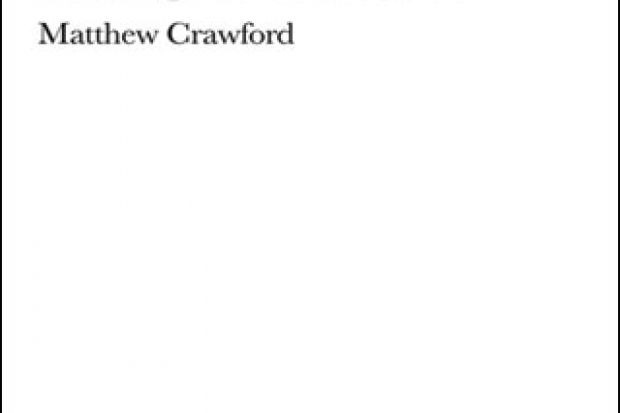The theme of “philosopher and mechanic” Matthew Crawford’s latest book is one many of us will doubtless have sympathy with: that in the 21st century there is simply too much information around, and as a consequence of this we are unable to maintain a coherent sense of ourselves. Or, as Emperor Joseph II (apocryphally, at least) said to the composer, “too many notes, Mozart”.
Mentioning Mozart in this review is not just a matter of homage. The anecdote touches on another facet of Crawford’s thesis, namely that our modern sense of living with “too many notes” is not just the result of living in an age of digital technology, with all the attendant arguments about human beings evolving into extensions of that technology, but a product of the Enlightenment view that “we increasingly encounter the world through representations”. In this, Crawford says, “human experience has become a highly engineered and therefore manipulable thing”.
Very few people would reject the idea that human beings can be persuaded to do all kinds of things that are not in their, or anyone else’s, best interests and might also be immoral, illegal and make you fat into the bargain. The solution, Crawford suggests, is to follow the advice of Simone Weil and learn “true attention”. Indeed, Crawford is so fond of this quotation from Weil that he repeats it, endorsing more than once Weil’s view that when we really and truly concentrate our attention “we destroy the evil in ourselves”. But this is, alas, a less than convincing claim, and one that has nothing to say about the focus of our attention or how we have come to it.
A more compelling theme in Crawford’s book is the endorsement of the ancient view (systematised, for example, in the order of the monastic day) that work should be both mental and physical. Our loss of competence in practical skills is something that many will acknowledge; Robert Pirsig, for example, made it the theme of Zen and the Art of Motorcycle Maintenance, as did Crawford himself in his 2010 book The Case for Working With Your Hands: Or Why Office Work is Bad for Us and Fixing Things Feels Good. But while we might all mourn the disappearance of such abilities, our mourning has a complex politics to it, an aspect of which is the refusal to recognise that certain practical skills have little or no market value and have disappeared because people have found far more remunerative ways of providing for themselves. Praise for the care and attention devoted to flipping burgers might be quite a bit more convincing if it were accompanied by a suggestion that we might, as a society, be rather more generous with all kinds of rewards to those performing practical tasks.
The thesis of Crawford’s book (richly supported as it is by many quotations from canonical philosophy) demands some interruption by two points in particular: that for many people the fragmentation of attention is a necessary social skill, as in multitasking; and that far from having too much on our minds, we have too little, most importantly, to resist the tsunami of rubbish that is emptied over our heads every day. It is difficult to countenance the argument that resisting that tidal wave could be achieved simply by closer attention to particular tasks. Indeed, social and political questions – especially those related to money and power – seem to have disappeared from this narrative. Barack Obama once encouraged an African-American cleaner by urging him to be the “best cleaner in America”. That man was no doubt already paying detailed attention to his task, but it was unlikely to be richly rewarded. An exhortation to “pay attention” can be interpreted in two ways.
The World Beyond Your Head: How to Flourish in an Age of Distraction
By Matthew Crawford
Penguin, 320pp, £16.99 and £9.99
ISBN 9780670921393 and 9780241959459 (e-book)
Published 9 April 2015
Register to continue
Why register?
- Registration is free and only takes a moment
- Once registered, you can read 3 articles a month
- Sign up for our newsletter
Subscribe
Or subscribe for unlimited access to:
- Unlimited access to news, views, insights & reviews
- Digital editions
- Digital access to THE’s university and college rankings analysis
Already registered or a current subscriber? Login





